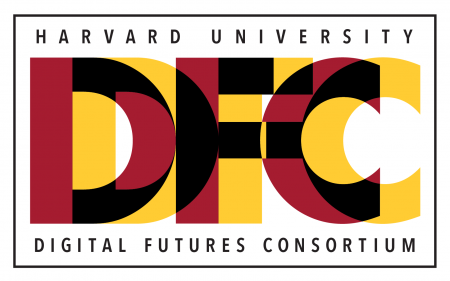
CAMBRIDGE, MA — The Digital Futures Consortium at Harvard (DFC), an active collaboration across the University since 2013, is disbanding at the end of this spring term. Initiated for the purpose of creating a network of technologists, faculty, researchers, and librarians engaged in the ongoing transformation of scholarship through innovative technology, the work the DFC has been providing on an informal basis has now become part of more formal initiatives on campus. Its workshops, like Visual Eloquence, and some of its informal hands-on basic training around digital tools — along with many of its current members — are now elements of the broader Digital Scholarship Support Group (DSSG).
The DFC’s Discovery Series, initiated two years ago with the opening of the new Cabot Library and its Discovery Bar, will continue under the auspices of the Cabot and Lamont Libraries and the DSSG. The Art Tech Psyche annual series that grew out of the DFC five years ago — the brainchild of Susan Berstler of the Cabot Science Library and Christopher Morse, formerly of Digital Arts and Humanities in Research Computing — is on track to continue with Cabot Library as a venue, thanks to the collaborative support of the Library, the DSSG, and other interested stakeholders.
The DFC was dedicated to sharing expertise across the global academic community, facilitating new forms and methods of research, and fostering collaborative projects that bring about field-changing developments in scholarship. At a time when the campus was in the midst of reorganizing and initiating strategic plans for supporting digital scholarship, the DFC provided a needed forum for bringing greater awareness to new scholarship through new tools and methods of research, and its natural evolution toward becoming integrated into the work of more formal initiatives is an indication of its success.
There have been many staff, faculty and students that have helped in many ways with DFC events and activities in the past six years, and we thank everyone who has helped us at any point. We would like to give a very special thanks to the efforts and ideas of the DFC core members and supporters past and present. The list below represents this core and their affiliations at the time of their membership:
- Mary Clare Altenhofen — Harvard Library (Fine Arts)
- Anna Assogba — Harvard Library (HCL)
- Amy Benson — Harvard Library (Schlesinger)
- Susan Berstler — Harvard Library (Cabot)
- Cole Crawford — Digital Arts and Humanities
- Zachary Davis — Harvard X
- Claire DeMarco — Harvard Library (Central)
- Enrique Diaz — Harvard Library (Lamont Media)
- Jeff Emanuel (co-chair) — Harvard X; Academic Technology FAS
- Reinhard Engels — Office for Scholarly Communication
- Susan Fliss — Harvard Library (FAS)
- Jeremy Guillette — History Department
- Kevin Guiney — Academic Technology FAS
- Odile Harter — Harvard Library (HCL)
- Judd Harward (co-chair) — Digital Arts and Humanities
- Adam Kellie — Harvard Library (Imaging Services) (DFC logo design)
- Nicole Legnani — Digital Arts and Humanities
- Pepe Lopez — Academic Technology FAS
- Erinlea McGowan-Moniz — Harvard Library (Lamont Media)
- Christopher Morse — Digital Arts and Humanities
- Lynn Sayers — Harvard Library (Lamont)
- Marty Schreiner (co-chair) — Harvard Library (HCL)
- Sarah Searle — Digital Arts and Humanities
- Malgorzata Stergios — Harvard Library; Digital Arts and Humanities
- Jeff Steward — Harvard Museums
- Rashmi Singhal — Digital Arts and Humanities
- Hugh Truslow — Harvard Library (HCL)
- Katie Vale — Academic Technology FAS
- Ann Whiteside — Harvard Library (GSD)
- Paul Worster — Harvard Library (Lamont Media)